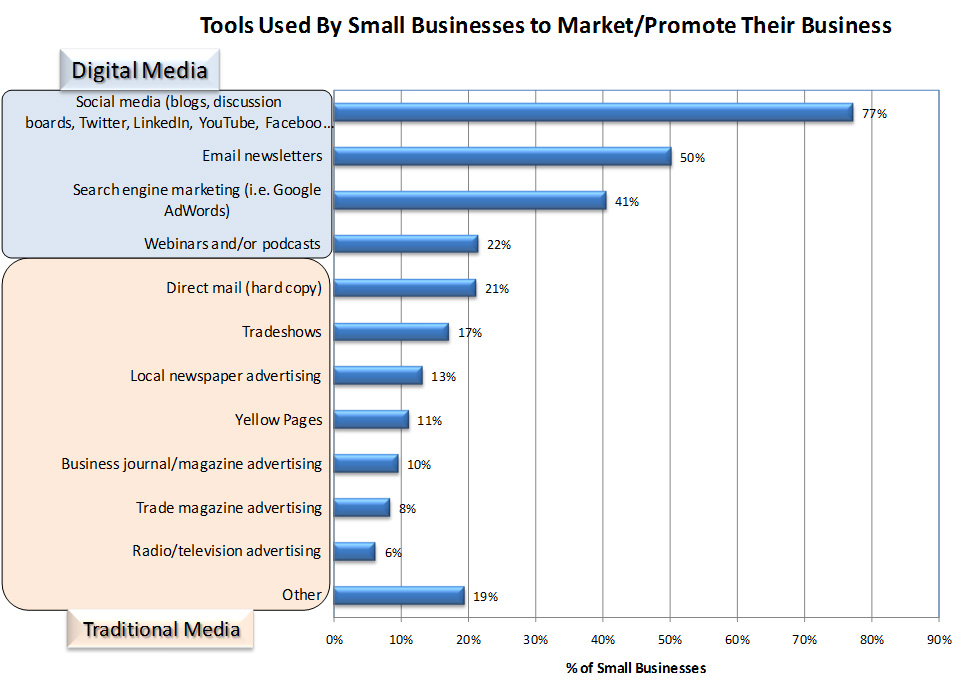In a recent very small business (businesses with 10 employees or less), Social Media ranked at the top of the list among the tools used by small businesses to market/promote their business (see Figure 1). The use of all ‘Digital Media’ tools by SMB has seen a dramatic increase in the past 2 years at the at the expense of ‘traditional media’ tools. Many businesses are finding that marketing campaigns using traditional media tools are seeing reduced effectiveness in reaching their target audience. Consumers and businesses are placing less trust on information provided through traditional marketing vehicles, as those are mainly static tools supporting one-way conversations – other than word-of-mouth. The new digital media is changing the rules of marketing and even small businesses need to proactively participate in this change.
Figure 1
Why has social media seen this dramatic increase? This is primarily driven by 3 factors:
- Change in the consumer and business workers personal communication environment and habits
- Low barrier to start participating in the social media communications – tools like Twitter, Facebook, WordPress are free. Social media is much more than traditional forms of viral marketing – it is an effective and inexpensive way to convert contacts into a referral network
- Much more real-time communication support to start conversations with existing customers and prospects
As the data shows, most small businesses are already participating in social media to varying degrees. Most of the social media adoption by small businesses is happening in an adhoc and sporadic manner. Majority of it is being driven by their use of of these social networking sites for personal communications. This use of social media in business today is more experimental, some to get a feel of the type of small businesses that are starting to participate in such communications and others to experiment with the type of conversations that are taking place and the type of communications they could have using this medium. As small businesses get more comfortable with these communications media over time, their importance in the marketing communications mix will increase. However, there are several issues that need to be resolved before they become mainstream communication tools for the small businesses. Some of them are:
- Efficient and productive ways to monitor and participate in social media – small business do not have the time to individually monitor the various social media sites like Twitter, Facebook, LinkedIn, Blogs, etc. They need tools that can integrate with their existing business solutions to pull-in conversations that could have relevance to them. Some new solutions from vendors like Salesforce.com will help small businesses harness the power of social media through solutions like Service Cloud, Salesforce Answers and Salesforce for Twitter and Ideas. New vendors that provide some solutions in this area include Lithium, Helpstream and Elgg.
- Finding areas where social media can add value and provide business benefit – potential areas include product marketing and customer service
- Integrating Social Media solutions with current marketing tools – Now that we know small businesses are interested in social media, it would be a good (for ISVs) to integrate social media interaction with your current marketing solutions like CRM, e-mail marketing, marketing automation, etc.
- Customer sentiment monitoring – This is area small businesses can monitor conversations that are taking place about their products, brands and competition. Although this area today is primarily leveraged by larger consumer focused companies, over time this information can be leveraged by small businesses also.
To make this communication and collaboration effective and supportive of key business objectives, small businesses need to craft a social media strategy as part of a marketing plan to positively reinforce brand awareness and improve customer relationships.
Key elements to this plan should include:
- Integrate social media into your current marketing plan, don’t abandon what is working to get on the social media band wagon
- Find out where your target audience (existing customers and prospects) gathers online and learn how they are engaged. Start by asking your current customers where they are and then join in.
- Match your audience to the social media tools they use – some people like Twitter other prefer Facebook or LinkedIn. Focus on relationship building.
- Don’t limit yourself to most immediate “universe” of your target. Find people who touch your universe and engage them too.
- Listen to what people are saying about you in the social media world
- Use social media to drive traffic to your website
- Develop plan to measure the success of your social media efforts (topic for another blog)
